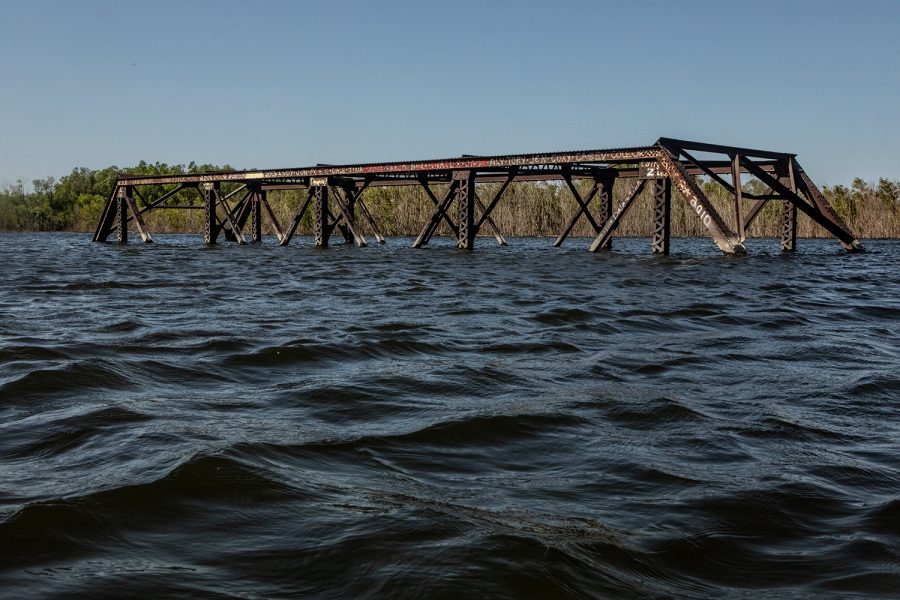New Iowa Policy Project climate report calls policymakers to action
A new report for The Iowa Policy Project emphasizes the need for policy change in order to mitigate the effects of climate change both in the state and nationwide.
An iron bridge on Greencastle Road south of Swisher, Iowa sits in the waters of Coralville Reservoir on June 10, 2019. The reservoir water level peaked at almost 705 feet on June 5, 2019.
September 17, 2019
A new report from the Iowa Policy Project details the record amount of precipitation in the Midwest, specifically in Iowa, from May of 2018 until April of 2019. The report also serves as a call to action for policy change that will address the mitigation of climate change.
James Boulter, professor in the Watershed Institute for Collaborative Environmental Studies at the University of Wisconsin-Eau Claire, is the primary author and researcher in the report and said the findings illustrate a need for action.
“There’s no question of whether or not we will craft some sort of policy responses to climate change,” Boulter said. “The question is, ‘when do we do it?’”
The findings indicate a temperature increase in both rural and urban areas and an annual increase in the average amounts of rainfall in Iowa communities, he said. It also details the damage that these weather patterns create, he added.
According to the data, Boulter said, the atmosphere above Iowa has been warming at a rate of 0.4 degrees Fahrenheit per decade since the 1970s.
RELATED: Opinion: To fight climate change, federal efforts are needed
“That’s a pretty significant increase, and there’s really no sign of it stopping,” he said.
In addition to the temperature increases, the average amount of rainfall on an annual basis in Iowa is also increasing, he said. As the temperature increases, rain events become more extreme and cause more damage, Boulter said.
Since the mid-70s, there has been a 30 to 40 percent increase in the amount of water that falls in extreme weather events in Iowa and, based on predictive models, it is likely that the state will see another 30 percent increase sometime around the 2030s, Boulter said.
“That signal of climate change is more clear in Iowa than it is for the country as a whole,” he said.
Boulter said that damage caused by these disasters amount to billions of dollars of infrastructure and crop loss, effects on human and agricultural health, and food insecurity.
“One of the biggest impacts of extreme rainfall and flooding is contamination of water supplies,” he said. “That might be because fertilizer and other nutrients applied to the soil are now not going into the soil, but they’re being washed off into rivers and streams.”
RELATED: Climate change hovers over campaigns
UI Associate Professor in the Department of Geographical and Sustainability Sciences Eric Tate looks specifically at floods and their vulnerability to society, as a hazards geographer.
Similar to Boulter, Tate emphasized the importance of being proactive in mitigation against natural disasters like floods. He said that, as the hydrological cycle is intensified by climate change, there needs to be an emphasis on acting early.
“I think we’re going to have to put more focus on mitigation. We put a lot of emphasis on response and recovery for floods … mitigation is looking forward,” he said.
According to the National Institute of Building Sciences, Tate said, every dollar spent on mitigation saves $7 spent on flood recovery.
Co-president of the Environmental Coalition Emily Manders said that reports like this are important, but it really comes down to policy change.
“We can continue to write report after report and encourage each other to make sustainable lifestyle choices, but without a response from the policy makers … no change will happen and impacts will worsen,” she said.
Boulter said that, among all these statistics and facts on economic and agricultural damage, what really matters is the lives that are affected. After Iowa’s last extreme flood, the damage to family businesses, farms, and homes was devastating, he said.
“That’s where this all becomes much more meaningful,” he said. “It’s easy to talk in statistics and probabilities, and even in costs, but at the end of the day, it’s really lives … and people’s futures.”






